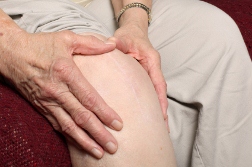 A study, presented in February 2012 to a meeting of the American Academy of Orthopaedic Surgeons (and reported by The Wall Street Journal; 2/6/12), suggests that the Zimmer NexGen is associated with a risk of isolated debonding, which occurs when the knee implant loosens from the cement. Researchers at the Mayo Clinic studied more than 1,350 total knee replacements from 2000 through 2011 that used the Zimmer NexGen knee replacement with one certain tibial component. Of the 3.9 percent of knee replacements that failed, 50 percent failed because the implant came loose from the surrounding bone. And, of those 50 percent, 80 percent of the failures were caused by isolated debonding.
A study, presented in February 2012 to a meeting of the American Academy of Orthopaedic Surgeons (and reported by The Wall Street Journal; 2/6/12), suggests that the Zimmer NexGen is associated with a risk of isolated debonding, which occurs when the knee implant loosens from the cement. Researchers at the Mayo Clinic studied more than 1,350 total knee replacements from 2000 through 2011 that used the Zimmer NexGen knee replacement with one certain tibial component. Of the 3.9 percent of knee replacements that failed, 50 percent failed because the implant came loose from the surrounding bone. And, of those 50 percent, 80 percent of the failures were caused by isolated debonding.Researchers noted that they had not seen problems with isolated debonding in other implants used at the Mayo Clinic.
In 2010, a surgeon who once trained doctors in using Zimmer joints spoke out about problems with the Zimmer knee. According to The New York Times (6/19/12), Dr. Richard A. Berger made more than $8 million in a 10-year period in his work with Zimmer. After Dr. Berger went public with a story illustrating what he said was a high premature failure rate, Zimmer argued that the problem was not with the joint but with Dr. Berger's technique.
READ MORE ZIMMER NEXGEN LEGAL NEWS
Lawsuits have been filed against Zimmer, alleging patients required revision surgery—where the implanted device is replaced by a new device—after their Zimmer NexGen device failed. The lawsuits seek compensatory damages for pain and suffering, emotional distress, and economic loss. Plaintiffs allege the various Zimmer NexGen Knee implant components are defective and caused serious injury.
